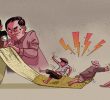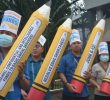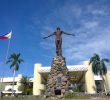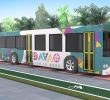By the Policy Study, Publication, and Advocacy (PSPA)
Center for People Empowerment in Governance (CenPEG)
The people when organized have proven their transformative power that can be mobilized to cobble the building blocks of a new government. From their ranks a genuine, incorruptible, and mass-oriented leadership for the national government can arise.
As the country reels from the impact of the global financial crisis, eyes are set on the next presidential race in May 2010. Latest surveys show that nine out of 10 Filipinos are keen on the presidential elections and this has given rise to speculations that civilian unrest would ensue if the polls are derailed.
The present dynamics of the presidential race has been set by the pre-election campaign of several contenders as seen in their inclusion in popularity rating surveys and TV promotions since last year. As expected the surveys unveil a long list of aspirants from traditional politics (trapos), those identified with President Gloria M. Arroyo and those from the opposition vying for popularity. The early birds have also resorted to �billboard politics� putting up giant billboards strategically along the main avenues of the National Capital Region and in the provinces.
Having loathed the association of traditional politics with corruption and mediocre performance � painted so graphically in recent years under Arroyo � some groups particularly from the middle class, civic organizations, and youth are rooting for alternative candidates for president as well as for the Senate. For these slots, among the names being floated are the current chief justice of the Supreme Court, Reynato Puno, and a number of governors and mayors claimed to be independent and whose election into office had the backing of grassroots communities.
It is a positive development to see a whiff of fresh wind in the country�s electoral politics long dominated by traditional oligarchs, fraud, and corruption. More important, however, is that the search for alternative candidates should have substance other than form. How �alternative� are these candidates and what kind of reform do they represent? How about their winnability in an electoral process where the results are decided chiefly by money and fraud?
At the moment, yet to be seen with clarity and consistency is the claimed alternative contenders� positioning on various issues that matter most to the masses. So far, aside from being depicted as models of �good governance� nothing is heard from these national aspirants on the issues of land reform, poverty, the neo-liberal globalization-driven financial crisis, human rights, peace talks, and so on.
The presidential office
The office of the presidency has always been tied with the oligarchy � the system of family dynasties that is at the helm of national and local power since election was institutionalized by U.S. colonialism. From the beginning of the current republic, the presidency has been filled by representatives of the Filipino elite and its vast central powers and state resources were used for self-perpetuation. Naturally, the country�s poor economic performance, corruption, breakdown of the rule of law, divisiveness and civil strife, and other problems have been blamed on the presidency. This is not to insulate, however, the bureaucrats in the state machinery, Congress, and even the judiciary from being held accountable to their own misdeeds.
After two civilian-led uprisings that toppled two discredited presidents in 1986 and 2001 the presidency has remained not only as the key dispenser and beneficiary of corruption but also as the roadblock to the popular aspirations for economic emancipation, peace, and justice. In recent years, the occupant�s vast powers and resources have been used for the abuse of authority, turning Congress into a rubber stamp to ensure presidential survival, and commit widespread human rights violations even as the people writhed with poverty, unemployment, and a future highly dependent on OFW remittances. Held for ages by the ruling oligarchs whose interests do not extend to the masses, the presidency has offered no clear visions to address the country�s fundamental problems and this is why it is increasingly isolated from the constituency whom it is supposed to serve.
Failures
With the foibles of the presidency � which have deteriorated into a catastrophe under Arroyo � all the more is there reason for the country�s social movement with its current various shades to flex its muscle in the push for genuine political reform. The country cannot wait for another presidential election before the people � in their organized formations � put their voice in the forefront of politics and, in the short term, decisively determine the outcome of the elections.
Reforming the country�s presidency � for that matter, the political system � takes a myriad of proposals. There are groups moving for changing the unitary form of government with a strong president into a federal system, and the presidency into a parliamentary form. This has created no strong groundswell of support, however, simply because some political bigwigs are using it as a pretext for power perpetuation through charter change. Others, including those from the interfaith and NGO spectrum, are calling for new faces in the local government to run for higher elective posts including the presidency hoping that their ascendancy would start the process of political transformation from within.
Already heard since the 1960s, the movement for a �moral revolution� or a �moral force� is being revived in the midst of corruption scandals and power intoxication among the traditional politicians. Although one problem is that some of the calls originate from notorious politicians, the advocacy may attract support from sectors such as schools and evangelical missions on the belief that moral values have a conscientizing and cleansing power.
The leftist cause-oriented movement holds the record of having the enduring and broadest voice in taking up various people�s issues ranging from land reform, trade union rights, human rights, to U.S. intervention. It was in the forefront of the ouster of the Marcos dictatorship in 1986 and in the removal of President Joseph E. Estrada in 2001. Its struggle for genuine agrarian reform, national industrialization, and a protected national economy is worth revisiting in the midst of past and present presidents� failed pro-globalization policies and the wholesale trade of the national patrimony to foreign monopoly capitalists. The movement has given birth to the formation of Party-list groups in a bid to espouse new politics in Congress. However, its advocacy for radical social and political reform has borne the brunt of state repression �clearly indicating that the present state simply lacks the courage to face new ideas with a preference to engage these in the field of violence.
Critical junctures
At critical junctures of the Arroyo presidency, major political forces from the anti-Arroyo social movement were mulling the feasibility of setting up a transition council led by eminent persons. The council was to have a short-term program that includes sweeping electoral reform, a new people�s constitution, and finally an election to choose new national leaders. This remains an idea even as it has been swept aside by bigger events and now, the buildup to the presidential contest in 2010.
Even if the process of reforming the presidency and the political system it represents proves to be tough and drawn-out the period leading to the next elections can serve to articulate new visions and programs. Certainly, the political experiences and clout already gained in the forums of the streets, strikes, and legislative debates can be transformed into a collective muscle that can, at the very least, decide the outcome of the presidency.
The social movement�s engagement in the next national elections should be able to influence if not decisively define the political platform and criteria for electing the next president and this can be articulated among the country�s electorate. Not to be ignored, however, is the reform of the electoral process itself and much work and vigilance needs to be done in this area, as well.
The coming electoral exercise can serve as a popular education for the country�s voters toward making the country�s politics democratic, constructive, and development-oriented. Traditional politicians should begin listening to the people and stop claiming that it is only in their hands where the country�s destiny rests. The people when organized have proven their transformative power that can be mobilized to cobble the building blocks of a new government. From their ranks a genuine, incorruptible, and mass-oriented leadership for the national government can arise.(CenPEG)
Analysis









